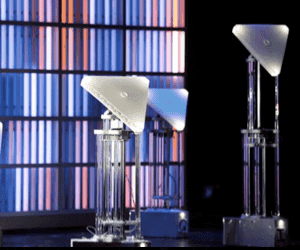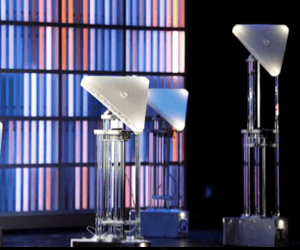Transhumanism in Opera: MIT Professor Creates Robotic Opera

Share
As is the case in many an Opera, “It’s not over until the fat lady sings.” In this case, a more appropriate version might be “It’s not over until the transhumanist voice bellows.” It doesn’t quite roll off the tongue, but the new robotic opera “Death and the Powers” is showcasing an entirely new take on a classic art form. MIT professor Todd Machover combines OperaBots, Human Performers, and integrates a new technology termed ”disembodied performance” to create a totally technological experience. “Death and the Powers” tells the story of Simon Powers, a successful businessman and inventor who wants to leave more behind than just the things that he has created. The story opens with him stepping into “the system” – his invention that will take his being from human reality to virtual reality, existing only as an electronic presence that will continue to control his family and businesses. His virtual being sings “And by the way, I have billions of bucks, And I can still sign checks.” You tell ‘em Simon.
In true operatic form, the ensuing tale is a dramatic one, following his third wife, his daughter, and his adopted, semi-robotic son as they come to terms with their new virtual patriarch. In a nut shell: the daughter misses her flesh and blood father, and gets philosophical trying to decide whether to follow him into “the system” or to remain human and embrace the finality of death; the adopted son who is already half robotic is all for transcending the mortal world idea; and the wife struggles to come to terms with a virtual husband. Below is video of her singing an aria entitled “Touch me” to the chandelier that her husband inhabits at the moment. Yes, it’s as weird as it sounds.
All in all it seems a little cheesy and a bit too sci fi for my tastes, but the reviews are good, and the questions posed are unarguably relevant in today’s day and age. As technological advances bring us closer to a time when something like this is possible, we may soon be pondering the same things as the characters in this Opera. If we lose a loved one, but a part of them remains on a computer, how do we grieve their loss? Ghost stories might cease to be scary if everyone is surrounded by the virtual presence of non-human relatives. Perpetuating one’s life would likely have consequences that we may not even be able to imagine, so would this technology really be a good thing? On the other side of that coin, would you be willing to commit your psyche to an electronic form, especially when we have seen that technology doesn’t always work the way we want it to? In an interview on NPR, the Opera’s creator Todd Machover points out that “One of the biggest limits to technology, which we know all too well [is that] we can make all kinds of technology, but the way the technology evolves, its implications, what happens with it is very seldom the way we imagine it.” Despite the cautionary elements implicit in the story, Machover and the show's other creators insist that it isn’t meant as a didactic tale, but rather a commentary on the nature of life, love and death in a technological age.
Be Part of the Future
Sign up to receive top stories about groundbreaking technologies and visionary thinkers from SingularityHub.


Though his human body is gone, Simon Powers continues to be a controlling presence in his family. Naturally this presented a challenge for production – how could Simon Powers remain a central character and interact with the others without having an actor physically present on stage? To solve that conundrum, Machover and his team at MIT’s Media Lab developed “disembodied performance” technology specifically for the show. Once Simon ceases to be human and the actor leaves the stage, he is hooked up to a variety of sensors and he continues to sing and participate in the show from off stage. The sensors measure things like his posture, his gestures, his muscle tension and breathing. All of this is fed into computers and the outputs are real time graphic representations and robotic movement on stage that roughly correspond to the actor’s movement offstage. To the audience, it seems like the virtual being is present in the bookshelves, chandelier, and robots that make up the set. Check out this video showing some of these robots in action.
https://c.brightcove.com/services/viewer/federated_f9
Using technology to transform a classic art form in order to explore the potential impact of technological advances on our lives - leave it to MIT right? The story of Simon Powers might not appeal to all opera fans, but at the very least you have to admit that seeing robots perform in an opera would be kind of cool, and the central themes are fairly universal. The concept of life after death is paramount in many religions, and the subject of prolonging life is nothing new either. Currently, scientists are working to grow replacement organs, develop nanobots to cure cancer, and artificial limbs that could be controlled by chips implanted in our brains. So downloading grandma and saving her for future generations might just be something we have to think about one of these days as technology gets more and more advanced. As Simon Powers sings pre-virtualization, “I’m nearly out of matter. But maybe I’m not out of time.”
[image credits: MIT Media Lab ]
[video credit: MIT News Office, The Boston Globe]
[source: MIT Media Lab, On Point]
Whitney's thesis research revolved around creating a 3D patch of skeletal muscle tissue from stem cells and much more.
Related Articles

Scientists Send Secure Quantum Keys Over 62 Miles of Fiber—Without Trusted Devices

This Light-Powered AI Chip Is 100x Faster Than a Top Nvidia GPU

How Scientists Are Growing Computers From Human Brain Cells—and Why They Want to Keep Doing It
What we’re reading
